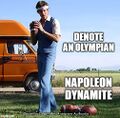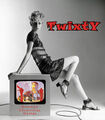Games (nonfiction): Difference between revisions
No edit summary |
No edit summary |
||
| Line 15: | Line 15: | ||
<gallery> | <gallery> | ||
File:Denote an Olympian.jpg|link=Denote an Olympian|"'''[[Denote an Olympian]]'''" is an anagram of "'''''Napoleon Dynamite'''''". | File:Denote an Olympian.jpg|link=Denote an Olympian|"'''[[Denote an Olympian]]'''" is an anagram of "'''''Napoleon Dynamite'''''". | ||
File:Dungeons and Collins.jpg|link=Dungeons & Collins|'''[[Dungeons & Collins]]''' is a fantasy tabletop role-playing game set to the music of Phil Collins. | |||
File:Connect Forrest Gump.jpg|link=Connect Forrest Gump|'''''[[Connect Forrest Gump]]''''' is a 1994 American gaming-drama film about Forrest Gump (Tom Hanks), a slow-witted and kindhearted man from Alabama who witnesses and unwittingly influences several defining historical events in the 20th century United States while playing Connect Four. | |||
File:Someone Sank My Battleship.jpg|link=Someone Sank My Battleship|"'''[[Someone Sank My Battleship]]'''" is a song by Elton John. | |||
File:Do You Believe in Warships.jpg|link=Do You Believe in Warships|"'''[[Do You Believe in Warships]]'''" is a song by American rock band The Lovin' Bombshell. | |||
File:TwixtY.jpg|link=TwixtY|'''[[TwixtY]]''' is a two-player strategy board game where players alternate turns placing pegs and links on Swinging Sixties icon Twiggy in an attempt to link their opposite sides. | |||
File:A Game of Hustlers.jpg|link=A Game of Hustlers|'''''[[A Game of Hustlers]]''''' is a 1959 novel by Walter Tevis and George R.R. Martin about Daenerys Targaryen, a young pool hustler who challenges Baratheon Fats for the Westeros Championship Tournament. | File:A Game of Hustlers.jpg|link=A Game of Hustlers|'''''[[A Game of Hustlers]]''''' is a 1959 novel by Walter Tevis and George R.R. Martin about Daenerys Targaryen, a young pool hustler who challenges Baratheon Fats for the Westeros Championship Tournament. | ||
Revision as of 19:17, 14 January 2023
Games
Introduction
A game is a structured form of play, usually undertaken for entertainment or fun, and sometimes used as an educational tool. Many games are also considered to be work (such as professional players of spectator sports or games) or art (such as jigsaw puzzles or games involving an artistic layout such as Mahjong, solitaire, or some video games).
Games are sometimes played purely for enjoyment, sometimes for achievement or reward as well. They can be played alone, in teams, or online; by amateurs or by professionals. The players may have an audience of non-players, such as when people are entertained by watching a chess championship. On the other hand, players in a game may constitute their own audience as they take their turn to play. Often, part of the entertainment for children playing a game is deciding who is part of their audience and who is a player. A toy and a game are not the same. Toys generally allow for unrestricted play whereas games come with present rules.
Key components of games are goals, rules, challenge, and interaction[disambiguation needed]. Games generally involve mental or physical stimulation, and often both. Many games help develop practical skills, serve as a form of exercise, or otherwise perform an educational, simulational, or psychological role.
Attested as early as 2600 BC, games are a universal part of human experience and present in all cultures. The Royal Game of Ur, Senet, and Mancala are some of the oldest known games.
In the News
"Denote an Olympian" is an anagram of "Napoleon Dynamite".
Dungeons & Collins is a fantasy tabletop role-playing game set to the music of Phil Collins.
Connect Forrest Gump is a 1994 American gaming-drama film about Forrest Gump (Tom Hanks), a slow-witted and kindhearted man from Alabama who witnesses and unwittingly influences several defining historical events in the 20th century United States while playing Connect Four.
"Someone Sank My Battleship" is a song by Elton John.
"Do You Believe in Warships" is a song by American rock band The Lovin' Bombshell.
TwixtY is a two-player strategy board game where players alternate turns placing pegs and links on Swinging Sixties icon Twiggy in an attempt to link their opposite sides.
A Game of Hustlers is a 1959 novel by Walter Tevis and George R.R. Martin about Daenerys Targaryen, a young pool hustler who challenges Baratheon Fats for the Westeros Championship Tournament.
The Chromo-Pee Olympics is an international sporting event in which participants attempt to urinate in five contrasting colors.
Fiction cross-reference
Nonfiction cross-reference
External links
- A Game of Hustlers
- [ Post] @ Twitter (14 January 2023)
- Games @ Wikipedia







